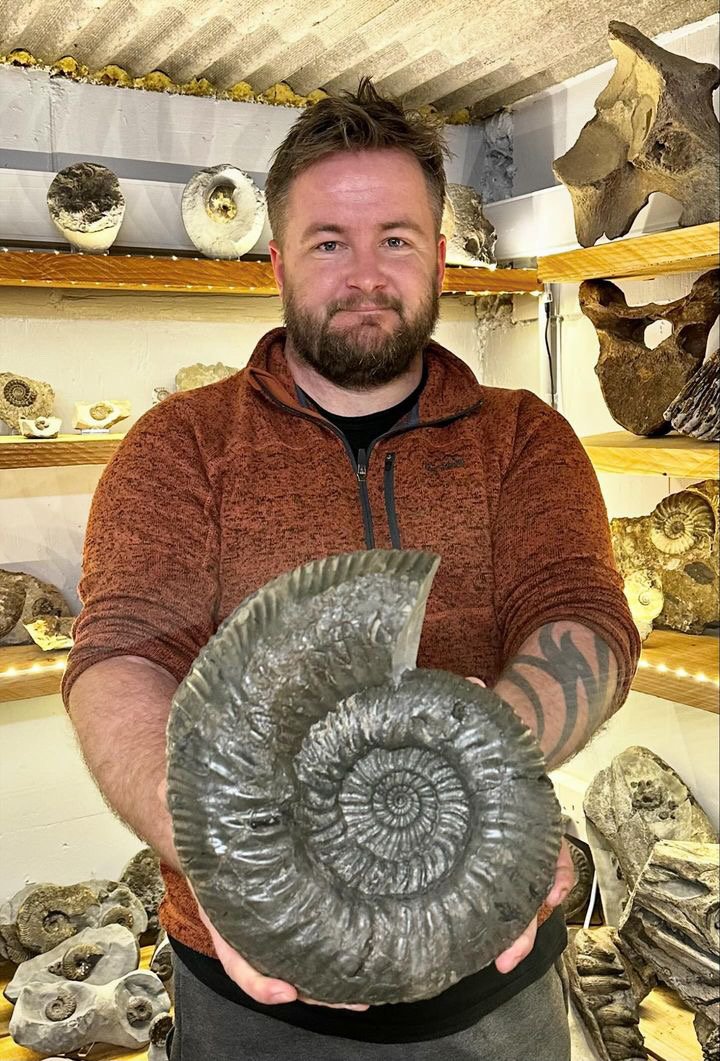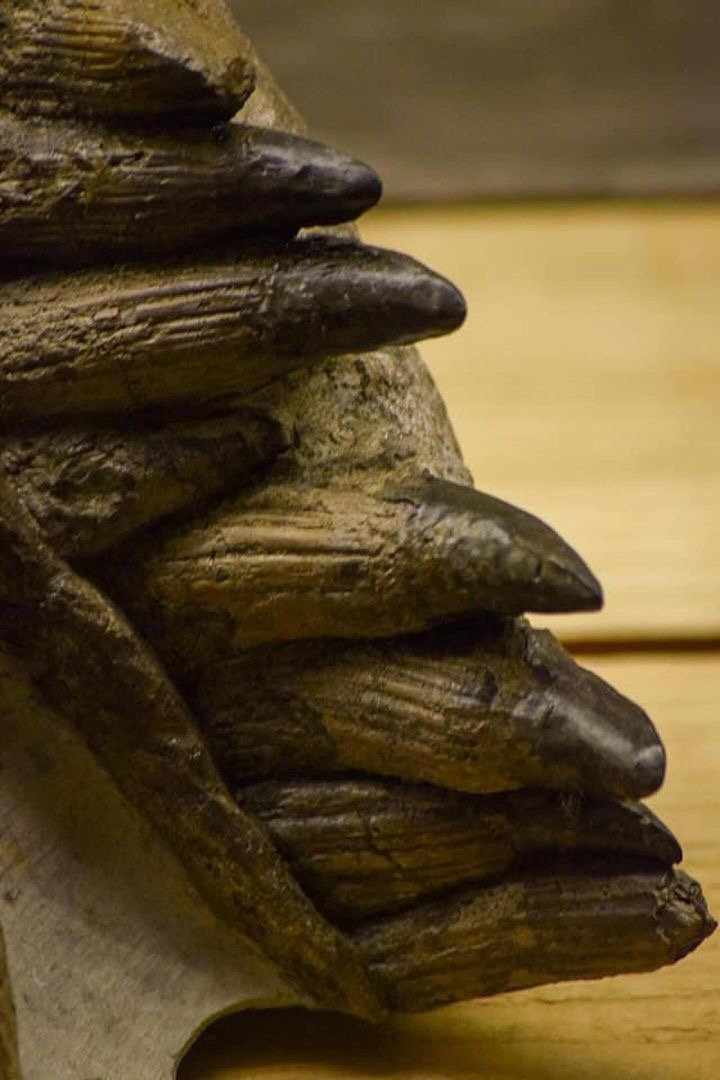Mark Kemp
From Hobby to Career: A Life Shaped by Fossils
Mark Kemp, a Hull native, inspired by a chance encounter, he has dedicated himself to exploring the Yorkshire coast, uncovering remarkable finds. Kemp's passion extends beyond personal collecting, as he shares his knowledge through fossil walks, preparation lessons, and educational programs. His story exemplifies the power of passion and perseverance, proving that turning a hobby into a career can lead to a life filled with discovery and purpose.
Early Life and Education:
My name is Mark Kemp, and I was Born in 1986, I have lived in Hull all my life and had a pretty good childhood. I was luckily born in one of the last generations where we could play out dusk till dawn and our parents did not worry (too much) about where we were or what we were up to. We did not have the technology today's kids have at their fingertips that's for sure.
I went to school on the council estate I was brought up on, both primary and secondary. Although I don't have great memories of school, I always seemed to struggle academically and never really understood the subjects as well as others. Apart from History and anything to do with natural history. I always had a fascination with the great outdoors and all things natural!
Discovering a Passion for Fossils:
I have always liked fossils and I think my fascination with dinosaurs when I was a young child had a part to play, but surprisingly it was not till later in life I really took a serious outlook on fossils. I have done metal detecting, bottle digging etc for many, many years and always had wanted to go fossil hunting properly. (i use to collect the odd fossil as a child when we visited my nanas caravan on the coast)
While working one day I was talking to a colleague about his plans for the weekend, he told me he was going Fossil Hunting and likewise I told him I was going metal detecting. From that moment on we were very good friends and have had some truly wonderful experiences. He invited me to go with him and his friend and I invited him along with metal detecting too. From that weekend on after my first real fossil hunting trip I was hooked and have been on the beach most weeks ever since. That was over 10 years ago now and that colleague is called John Koser.
I enjoy hunting for all fossils, especially on the Yorkshire coast as that is my stomping ground although I do travel around now and have recently had some great fossil finds in Wales and somerset. Ammonites are always great to find as they are more abundant than other fossils so it’s always nice to find a few. If you're lucky you can split them on the beach with a rock hammer and sometimes, they split perfectly revealing a hidden treasure. A sea creature that has been locked in time for millions of years. When we do this, we are the first people ever to see the fossil, when that ammonite was alive humans did not exist!
The Challenges of Fossil Hunting:
The most challenging aspect in my opinion is the fact that rocks are heavy! If I find something a few miles down the beach it can be extremely difficult work to get the fossil back. Some of the Yorkshire coast is very remote and not like the sandy beaches most people think of when they think about the seaside! I do sometimes have to reduce the size of some of the rocks the fossils are in with tools in order to make them more manageable. One of the other slightly more annoying challenges that I have to deal with regularly is people telling me I shouldn't be collecting fossils, and I should leave them for other people to see. They don't understand the hours and hours of preparation that goes into fossils before then are visible for people to really see them.
A Rare and Remarkable Discovery:
There are a lot of exciting finds for me. I have been very lucky in the department. I have found extremely rare heteromorph ammonites, heads of crinoids, dinosaur footprints and many other fossils but if i had to pick one it would be one of my recent discoveries. It was by chance as is with most fossil finds. I was on my way back with a heavy bag full of ammonites and I was looking for the path of least resistance over a big boulder field on a remote Yorkshire beach I visit regularly. I was just happening to be looking down while walking at this one certain point and noticed a huge limestone nodule stuck between two very large sandstone blocks. I looked more closely and instantly recognised the crocodile bones sticking out. To some people it's very difficult to see what I saw that day but to the trained eye it is obvious. It was a large bone block containing many different bones from an ancient marine crocodile, around 180 million years ago. It took some retrieving as it was wedged between the two larger blocks but me and my friend Nick managed to get it out and back to the van eventually, it was extremely heavy and was very hard work! I started preparing the fossil pretty much the next day as I was so excited, fast forward 30-40 hours and it was done. The huge rock had been on the beach for many, many years slowly eroding with constant tides and now it was in my display room in all its glory. I discovered the bone assembly has vertebrae, ribs, leg bones and many scutes perfectly preserved. It is an extremely rare and significant find for the Yorkshire coast.
Missed Opportunities and Future Hopes:
I have been invited to a few now but due to my own work commitments I could not attend. In the US these are much more common, The UK is definitely improving in my opinion but there is a long way to go before we are truly embracing what's beneath our feet. Most fossil ferrous locations are landfills or housing estates now which is a shame as we are losing so much history, knowledge and opportunity.
Unanswered Questions and Paleontological Dreams:
The Yorkshire coast is world famous for its Marine fossils, if it swam in the Jurassic seas there's a good chance we can find it on the Yorkshire coast. Dinosaurs however did not swim. they were land animals so as a result of that we don't find dinosaur remains. I would absolutely love to find some dino remains on the Yorkshire coast that would be a dream come true for me. We find the footprints but not the bones apart from a few small poorly preserved examples. I am hoping one day someone discovers something really significant.
Ethical Considerations and Sustainable Practices:
We have SSSI designation on some parts of the Yorkshire coast, this in theory offers protection to scientifically important specimens. There is also a fossil hunting code of conduct that I have touched up on above. It's a tough one with fossils as the coastline is constantly eroding which is releasing more and more fossils so I don't think they will ever end in my or in fact many, many lifetimes. Once on the beach in the high energy environment they really don't last too long and quickly are turned to sand or lost to the sea. We don't see museums or scientists on the beach any more looking for fossils, instead they pretty much rely on people like me to go out and find them. It opens a can of worms whenever ethics are brought up as some people think everything found should be donated to a museum and others think the opposite where most museums nowadays are very draconian, old fashioned and just hoard stuff in storage never to see the day of light again! I am somewhere in the middle and want to work with museums specifically to display my finds but as of yet have had no replies from the ones I have emailed. The brand-new Yorkshire natural history museum in Sheffield seems to be very forward thinking and have a really great attitude towards private collectors so fingers crossed they stay on this path and the future of private fossil hunting grows with that.
Parting Words:
I have been collecting fossils in a serious capacity now for over 10 years, nearly 2 years of that it has been a full-time work for me. I offer private fossil walks, preparation lessons, fossil preparation, education days and fossil sales. In the time I have been doing all this I have met people from all over the world and have some really great new friends. I consider myself very lucky to be able to turn my once hobby into a career and so far, it's proving very successful. Finding fossils on the beach is the bonus really. My office is the Yorkshire coast and that is pretty remarkable in itself.
Advice for Aspiring Fossil Hunters:
Anyone new to fossil hunting should first of all do a bit of research on their locality. There could be fossils very close by and they don't even know. The internet is a treasure trove on knowledge with so much information on localities and what can be found.
A few basics for anyone going to the beach for fossil hunting is to always check the tides, collecting should be done on a falling tide and make sure you're back to safety shortly after low water. Stay away from the cliffs and they are constantly crumbling and as a general rule of thumb we do not dig into the bedrock or cliffs without permission from natural England. If you are unsure, then join one of the many fossil hunting pages on Facebook and there many people will be able to help.
To continue following our explorer Mark’s journey or simply want to reach out and say Hi, you can connect with Mark on the following accounts:
Facebook: https://www.facebook.com/theyorkshirefossilhunter/
Website: https://theyorkshirefossilhunter.com/
Instagram: The Yorkshire fossil hunter (@yorkshire_fossil_hunter) • Instagram photos and videos






















